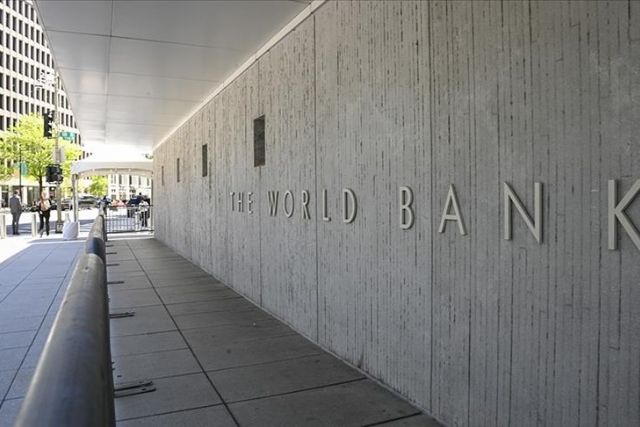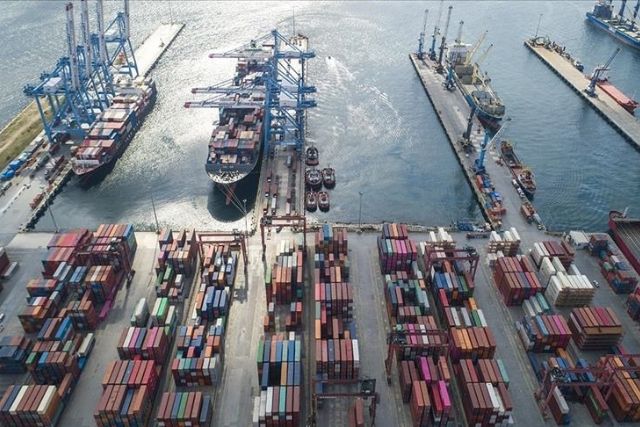'Choke off dollars to Myanmar military to make a change'
Activist Zarni urges imposition of strict sanctions against Myanmar junta, which is unleashing terror against people

ANKARA
Four months after a military coup ended Myanmar's short-lived experiment with democracy, Maung Zarni, a London-based Burmese academic and activist, is unimpressed by the international community's response.
In an exclusive interview with Anadolu Agency, Zarni, who is also general secretary of Forces of Renewal Southeast Asia, said the recent Association of Southeast Asian Nations (ASEAN) summit in Jakarta and the foreign ministers meeting of G7 countries in London did not come out with any concrete plan to help the return of democracy in Myanmar.
Describing the ground situation as "extremely serious," he said the army had unleashed a reign of terror to punish people.
"The Burmese public does not recognize the soldiers as their people. Because the soldiers are terrorizing the public in every conceivable way, vandalizing properties, cars, motorcycles, homes, stealing, looting, kidnapping people, asking for or demanding ransoms," said the activist, who is also coordinator of the UK-based Free Rohingya Coalition and a fellow of the Genocide Documentation Center in Cambodia.
Dismissing the argument that sanctions do not work in such situations, he said France, the US, Malaysia, Thailand, South Korea, and Singapore were vital to change the behavior of military rulers of Myanmar by choking their dollar pipeline.
He said that just sanctioning ten generals means nothing. He said there is a need for big companies like French Total France, US Chevron, and South Korean companies to pressure the junta.
Zarni said the military regime was parking their money in Malaysia, Thailand, and Singapore. "These three countries can be pressured to freeze the Burmese government funds and also military's cash then it will seriously hurt the military," he added.
He said that people on the ground have been urging the international community to exert maximum pressure in the form of imposing military, diplomatic, political, and economic sanctions.
"The least the international communities and countries and governments can do is stop being hypocritical," he said.
The activist further added that while there was a positive change at the societal level towards the Rohingya ethnic community, but time has not yet arrived for their return from camps in Bangladesh and elsewhere.
Soldiers terrorizing people
Anadolu Agency: Since you are in touch with people on the ground, what is the condition right now inside Myanmar? When you look at history-wise, did you expect this current reaction against the coup?
Maung Zarni: For the conditions inside are very much like a country under terrorist or fascist occupation. This is the sentiment in the general public across classes and religious and ethnic lines. But I don't say this lightly as a scholar because when you look at the situation [you can see] that something extraordinary and unprecedented took place. Entire national armed forces, not just a group of generals, that launched the coup all of a sudden is being commonly seen by the public as an alien occupier. The Burmese public does not recognize the soldiers as their people because they terrorize the people in every conceivable way, vandalizing properties, cars, motorcycles, homes, stealing, looting, kidnapping people, asking for or demanding ransoms.
And now, the situation has reached a point where no one in their right mind in Burma would leave their homes with their smartphones on there. Because every single town and city, there will be checkpoints, where the citizens are demanded to hand over their mobile phones. And they are forced at gunpoint to share the passwords, show what they have been communicating, even if it is non-political. So, people have started buying little button old phones in vogue 10-15 years ago. That is the situation, the public has been terrorized. But something unexpected is happening, which is very scary.
Q: Do the people own the resistance against the coup? Or is it just limited in some segments? Is there any leader leading the protests?
Zarni: Firstly, the opposition movement against the coup and more broadly against the very existence of Tatmadaw or the National Armed Forces [of Myanmar] is very widespread, universal across classes and ethnic lines. In previous waves of opposition going back to 1962, when the first textbook coup took place, it is completely different. This wave, which is still unfolding, includes even Rohingya. Think about it. The Rohingya is in Yangon and other places came out holding signs identifying themselves as Rohingya. The reason for that is Rohingyas feel safe. And the majority public that for the longest time supported the genocide against Rohingya is embracing the Rohingyas on the streets. So, this is the broad-based opposition, the movement, it is organic. It is not instigated by the CIA or, you know, Britain or any other external powers. If anything, the ownership of the movement is in the hands of Burmese communities, rich and poor, Muslims and Buddhists, ethnic nationalities with organizations, and on armed majority and Burmese in towns and cities.
The leadership is no longer with a single individual. Because this is an organic movement, there are multiple networks that coordinate, and there is something called the civil disobedience movement, primarily made up of hundreds of thousands of state employees in different sectors from public health and education to transportation and telecommunications and anything in between. Also, there are the private sectors, even departmental stores, small shop owners and whatnot, they join in, street vendors join in. There is a political leadership coming from a group of members of the Parliament elected from National League for Democracy that was ousted, and as well as smaller parties, and also there is a newly formed National Unity Government. So, there are two entities called that the Committee Representing Parliament and the National Unity Government. All the members of these two coordinating bodies are in exile.
Nonfunctional state
Q: It looks like that junta is consolidating itself by resorting to a reign of terror and suppression. Can the current resistance withstand such an onslaught?
Zarni: The junta is having extreme difficulties in consolidating its power or grip on the state. It has been denied to be a functional state and a functional economy by both public and private sectors. The communities across Burma are self-administering. Because the military junta can only issue orders. But those orders are not being implemented. So, if you have a situation, as the military coup regime, that has to point guns at doctors, academics, and teachers to return to work, what that means is that this junta is in no position to consolidate power. Quite the contrary, in the last almost 60 years, this is the first time the very powerful military is unable to have a functional state. It is degenerating into either a half-state or non-state actor.
Q: Last fortnight, there were two important international meetings that discussed Myanmar -- the G7 in London and ASEAN in Jakarta. How far will the outcome of these summits help end crises in Myanmar? Why the ASEAN summit, in particular, failed to provide a clear timetable and no clear enforcement measures to put pressure on the junta?
Zarni: Yeah, let me answer the first one, the ASEAN. The ASEAN held a summit in Jakarta. The coup leader was not identified as the leader of the country [Myanmar]. He was, as a matter-of-fact, identified as commander in chief of the armed forces, but not as leader [of Myanmar]. And also, the seating arrangement made it clear. He was outside the leadership circle. However, the ASEAN came up with a rather Trumpian statement, a five-point consensus calling on "all parties" to cease violence. Whereas the fact is that the overwhelming violence has been perpetrated by the very military.
And within 48 hours, the commander-in-chief who attended this summit in Jakarta essentially declared to his rank-and-file members inside Burma through a press meeting telling them that ASEAN has cooperated with the Burmese State Administration Council or the coup regime. Factually, that was not true. At the ASEAN, the leaders, particularly Indonesia, Malaysia, took pain to make sure that they were not legitimizing the coup and the coup leader by inviting him over there, to Jakarta.
The commander in chief also said that he would allow the ASEAN envoys to come in and will continue cooperation with the ASEAN when stability is restored. In other words, it is not convenient for the military for ASEAN to get involved at this point. So, ASEAN Summit, I would say, was a complete failure because ASEAN has been fooled.
I am not up to date on the G7 meeting, to be honest. I understand that issue was put on the agenda. The seven industrialized or wealthiest economies have enormous economic leverage. If you look at France or the US, for instance, two of the major national brands, Total France, the oil company, and the Chevron of the US, are two of the largest external revenue providers to the Burmese military through the Myanmar oil and gas enterprise, which is completely now controlled by the Burmese military.
So, we are looking at the G7 governments that have failed to essentially stop the revenue flows from their oil companies and gas companies. And those dollars and euros help and finance the Burmese military. So, the statements and sanctions on ten generals, none of that amounts to anything because the junta is prepared. But what needs to happen is Total France, Chevron of the US, and maybe South Korea as well, because it also has a massive industry presence to put their money where their mouth is. It is not enough to just like tinker around. They need to turn off this, you know, dollar pipeline that keeps this regime afloat. The regime is in a really difficult situation with No international legitimation and legitimacy and no acceptance by the domestic population at all.
China top investor in Myanmar
Q: The ASEAN has now begun negotiations to hold meetings at the foreign ministers level with the US as well as with China to seek support to resolve the crisis in Myanmar. What has been the progress and will the US and China come together on this issue?
Zarni: No, the US and China will not come together. For very simple reasons. China sees the military junta as still capable of providing stability and protects Chinese economic interests, above all, the 800-kilometer-long natural gas and oil pipeline that starts from the Rohingya area. I should say, from Beijing's perspective, the pipeline is considered a sovereign asset that provides alternative energy security or alternative security routes or energy routes to China. So, China has this close in the body politics and the economy of Burma.
China is one of the top investors in Burma. But the US has been moving essentially containing China's naked economic and geopolitical ambitions, using the Quad alliance that includes Australia, Japan, India, and the US, which is likely to become some kind of a military alliance down the road.
They held the military exercises first time just outside Burma's national waters in the Bay of Bengal in the Indian Ocean. So, you cannot have two major giants advancing or protecting their strategic interest to agree on a case like Burma. China has proven itself to be extremely negative when it comes to genocide or when it comes to terrorism.
Q: What have been the efforts of the UN since the military took power in the country? Why, so far, the world body has not been able to put any pressure on the military rulers?
Zarni: In a word, the most important and powerful body in the world, namely Security Council -- not the UN General Assembly, nor the UN Human Rights Council -- has been a complete failure. It has been a failure in the case of the Uighur people. It has been a failure in the case of Palestinians.
The UN charter says that if a member state of the UN fails to protect its citizens by whatever, for whatever reasons, the international community that is UN will have to intervene to protect the people. But that principle cannot be triggered because Security Council is in a permanent state of paralysis. After all, two veto powers, Russia and China, have unconditionally protected and supported whatever the Burmese military has been doing to its people. So, if you have got that situation, the Burmese military feels it can do anything it wants. The only thing that the Burmese military would pay attention to is the possibility of the Security Council coming up with a strong united position and imposing political, diplomatic, and even military pressure on the Burmese military. But that is not going to happen. And that has not happened in the case of the Rohingya genocide.
People feel sorry about Rohingya
Q: I want to just get back to the Rohingya crisis. And if you remember, in the last interview, you had said that this coup had brought an introspection within Myanmar society and people are largely feeling sorry about Rohingya. Will this attitude in the future help them to return to their homes and, more importantly, whether this camaraderie will last long?
Zarni: The Rohingya issue has been a major factor just two or three days ago at the US Congress, the Foreign Relations Committee of the US representatives. The issue of Rohingya was pointedly raised by several Congressmen. They wanted to know if Rohingya will be unconditionally accepted as full and equal citizens. And if the new interim government of this new democratic movement will have a Rohingya representative on its cabinet. So, the national unity government representative, the ambassador to the UN, has failed to address that question satisfactorily. That is what is happening at the level of politics.
But at the level of society, something radically different and better is happening, which is that the acceptance, widespread acceptance of Rohingya people by the multi-ethnic communities, perhaps except for a section of a very nationalistic and anti-Rohingya Rakhine. That is quite a worrying sign. Having said that, there is an inclusive society emerging that sees Rohingya as our own brothers and sisters, which is positive, there is still some serious negative emerging against the Rohingya.
But irrespective of what is happening societally or at the level of politics, I think the Rohingya in Bangladesh or other parts of the world will not be able to return to Burma unless the big picture changes. Unless the perpetrating Burmese military is defeated. So, there's a long way for the Rohingya. And just as there is still a long way for the majority and other minority communities. Because now we are, in essence, a revolutionary situation. So, there cannot be any type of peaceful negotiated settlement because civil administrators who are appointed by the military are being killed. And bombs are going up in different cities.
And there is fighting going on in three or four major ethnic regions where the Burmese military is sustaining very heavy casualties. Soldiers by the hundreds were killed just this week. We have this civil war raging on. There are thousands of young people who call themselves Generation Z who are undergoing military training, including inventing and using improvised explosive devices (IEDs), the thing that you saw in Afghanistan and other Middle Eastern war situations. That is what is happening. So, against this backdrop, Rohingya repatriation is not conceivable.
International community key to bringing change
Q: The special envoy of the UN secretary-general on Myanmar had said that the deputy commander of Myanmar's military told her that the military is not afraid of sanctions. So, what is left for the international community to do that will make a difference on the ground?
Zarni: I think, when we use the word sanctions, we cannot make a general statement saying sanctions are effective or not effective? The answer is, it depends on what type of sanctions, right? If you would say, like the international community, well, that means like we include all the private sector corporations and the UN member states. So, even within the ASEAN bloc, 10-member states. Singapore is the largest investor.
Singapore has been known to be the number one place for the Burmese military and its cronies to launder its ill-gotten billions. So even a small city-state like Singapore can be persuaded or pressured to freeze the Burmese military's assets, the money. The Burmese military also kept or has kept its money in places like Thailand, banks in Thailand, banks in Malaysia. We cannot do anything about China if they keep money in Shanghai. But in these three countries -- Malaysia, Thailand, and Singapore -- banks have become homes for Burmese military money. If these three countries can be pressured to freeze the Burmese government funds and also the military's cash, then it will seriously hurt the military.
Singapore is one of the countries whose prime minister and foreign minister keep talking that sanctions are not effective. But they have the leverage. They are not prepared to use it because it is against Singapore's economic interests. Singapore is the number one investor in Burma.
Give sanctions a try
Q: Several other counties have said that they do not support unilateral sanctions. And that such measures would only make the military more violent. How do you view the argument of these countries?
Zarni: I think it depends on who is saying if the countries that have heavily invested in Burma say their sanctions are or not as effective, as Singapore has said. All I say unilateral sanctions are not effective. But the question is, have they ever tried imposing sanctions themselves? And have they ever used it? You know, the sanction comes in different forms, diplomatic sanctions, political sanctions, etc. Then why not try? We cannot get more violent than this Burmese military. This is the military that killed more than four dozen children, some of them in front of their parents in their own homes. You cannot get more terroristic and violent than the current situation. Let the Burmese public worry about the type of violence they have to sustain. They are saying, "impose maximum pressure, military, diplomatic, political and economic sanctions. We are prepared to die for freedom."
It is nobody else's business to say that they care more about the Burmese people. The Burmese people on the ground in their teens and late teens, giving up their youth universities educational opportunities, jobs, whatever they have to fight back and expel this military that they consider terrorist. And so, the least the international communities and countries and governments can do is stop being hypocritical. Do not say that they are more concerned about the violence and the Burmese people on the streets who raised their lives.





